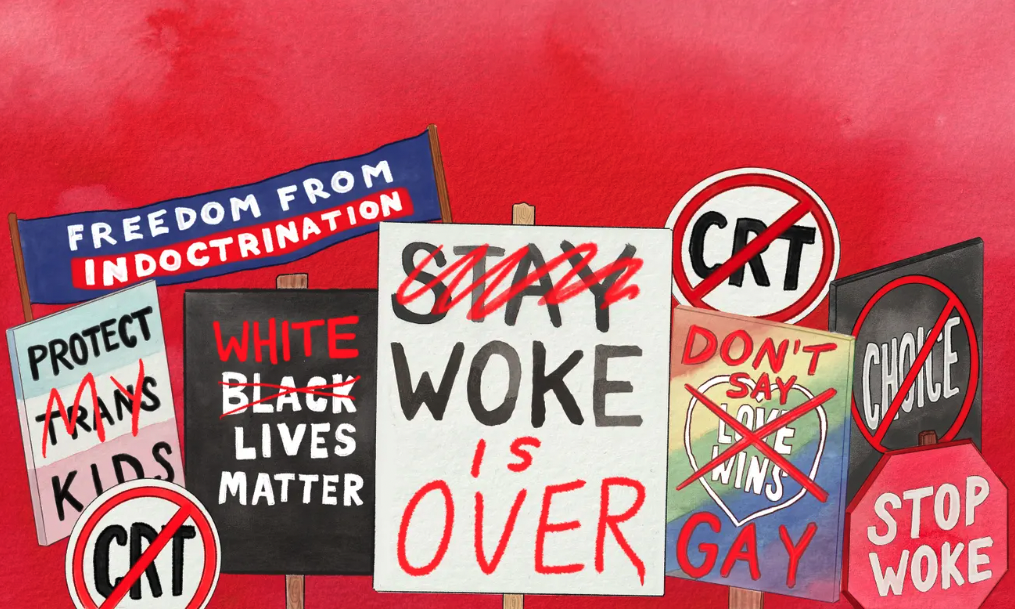Unpacking the Pejorative use of the Term "Woke"
Recognising Divisive Disinformation and Fostering Social Cohesion.
By now, we've all heard the term "woke" used in a disparaging way by someone in politics, the media, someone in senior management at work, or even a parent or partner. And it can be very challenging to respond effectively if we haven't given this phenomenon much thought and also daunting if we don’t feel like we have the language to broach the subject with them. It can be very disheartening and disappointing for us to see those we hold in high regard, or leaders in our professional and personal lives, using this term in a dismissive and disrespectful way.
The careless use of the term “woke” with an intended negative connotation not only undermines our efforts towards equity, inclusion and social cohesion, this tactic actively works to centre the needs, comfort and motives of those who are comfortable enough that they don’t want to see any change in society or the dynamics of the workplace. The use of the term in a disparaging way also reveals a lack of understanding of the term's history and its true meaning.
Those of us who want to contribute to positive social impact may feel hesitant at times to call out this misappropriation of the term, fearing backlash or damage to our reputation or relationships. Nevertheless, engaging in an open and honest dialogue is crucial to raising awareness and fostering a deeper understanding of the importance of a proactive approach to creating a more just and equitable world.
Here I provide a brief outline of the history and evolution of the term "woke," the disinformation campaign surrounding inspiring its misuse, and the importance of reclaiming the true meaning and function of this crucial word from the social justice lexicon. We will discuss strategies for bravely and compassionately addressing the pejorative use of "woke" in professional settings and offer insight into how we can foster meaningful conversations on the topic, even when it may feel like it is a risk to do so.
The Origins and Evolution of "Woke"
The term "woke" has its origins in African American Vernacular English (AAVE) and initially referred to being aware of social and political injustices, particularly those affecting marginalised communities. Over time, the term has been co-opted and, in some instances, used in a disparaging manner to dismiss and belittle genuine concerns about equity, equality, and social cohesion.
When used in a negative way, the term "woke" functions as a tool to derail conversations about social justice issues and acts to mock and insult both the person and the issue. By labelling someone as "woke" in a pejorative sense, the person using the term implies that the concerns raised are exaggerated, overly politically correct, or part of a self-righteous agenda. This tactic can effectively shut down dialogue, preventing meaningful discussions about the underlying issues.
Using "woke" in a dismissive manner contributes to maintaining the status quo by discouraging people from engaging with complex topics or challenging existing power structures. When a manager or executive uses the term, even in a subtle and not obviously offensive way, they are giving their staff a social cue. The subtext of this cue is saying, “you’ll do better here if you forgo conversations around equity and diversity, and get promoted faster if you toe the line of meritocracy and “procedural justice”.
It should be acknowledged that this is a way of intimidating people into silence when it comes from someone in a senior position at our workplace. This tactic works to undermine the opinions of employees and the work of individuals and organisations striving for equity and equality by trivialising their efforts and dismissing their concerns.
Historical Context and the Resurgence of "Woke"
The term “woke” is a part of African American Vernacular English (AAVE) and is used as a past participle of "wake", signifying an awakened state of consciousness or awareness, as well as the very literal meaning of staying awake or alert.
The roots of the term can be traced back to the early 1900s, with the first documented use of it happening in 1938 when Huddie “Leadbelly” Ledbetter ended a song by advising Black people travelling through Alabama to “stay woke”.
That was the era of segregation, public lynchings, sunset towns and the Greenbook; a time when staying in a certain town after sunset would get a Black person arrested or killed. In 1940, a member of the Negro United Mine Workers promised that the striking members would “stay woke up longer” than their opposition.
Another early example of its use in this context comes from a 1962 New York Times article, which quoted the African American novelist and playwright William Melvin Kelley as saying, "If you're woke, you dig it." In this context, "staying woke" meant remaining vigilant and informed about systemic racism and the need for social and political change.
The term gained prominence during the Civil Rights Movement in the 1960s and 1970s when activists used it as a call to action to raise awareness of racial inequality and social injustice. The beloved Martin Luther King centred this theme in his much-repeated “Remaining Awake” speech, in which he advises, “There would be nothing more tragic during this period of social change than to allow our mental and moral attitudes to sleep while this tremendous social change takes place.”
In recent years, "woke" has experienced a resurgence, driven by the Black Lives Matter movement and other social justice campaigns that have co-opted the term. It has expanded beyond its original focus on racial inequality to encompass a broader awareness of issues such as gender inequality, LGBTQ+ rights, and environmental justice. Social media has played a significant role in popularizing the term, as online platforms provide a space for activists and concerned citizens to share information, discuss issues, and mobilize for change.
The Misappropriation of the term "woke"
The co-opting of the term "woke" and its misappropriation for other social justice campaigns is another form of cultural appropriation, where elements of Black culture and language are adopted and repurposed by individuals or groups outside of the Black community to serve their own needs with no regard for the struggle from which it has sprung. This appropriation acts to render invisible the original authors and silence the intent and significance of these cultural elements, further marginalizing the community struggling for racial justice.
Similarly, the concept of "intersectionality" – coined by Black legal scholar Kimberlé Crenshaw in 1989 – has been subjected to appropriation and co-optation. Intersectionality was initially developed to address the unique experiences and challenges faced by Black women, whose struggles were often overlooked by both the feminist movement and the broader civil rights movement. The term was intended to highlight the ways in which multiple forms of oppression, such as racism and sexism, can intersect and compound one another and, in effect further marginalise Black women.
However, over time, intersectionality has been adopted and co-opted by various social justice campaigns and movements, always without proper attribution or acknowledgment of its origins. While it is important to recognize and address the intersectionality of different forms of oppression, the appropriation of intersectionality can inadvertently contribute to the erasure of the struggles faced by the very individuals it was initially intended to uplift.
Both "woke" and "intersectionality" serve as examples of how the adoption of Black knowledge for the benefit of others can have negative consequences. By co-opting these terms and concepts, individuals and groups outside of the Black community perpetuate a cycle of marginalisation, silencing, and invisibility.
To counteract this, it is essential to be aware of the history and origins of these terms and to use them in a manner that acknowledges and respects their intended purpose and significance. This not only helps to preserve the integrity of these cultural elements but also ensures that they continue to serve as powerful tools in the ongoing struggle for racial justice.
Intentional Disinformation: The Weaponisation of "Woke"
As the term "woke" has become used more regularly through its co-optation and misappropriation, some individuals and groups who take offence at the discussion of any form of social justice have begun to use the term in a derogatory manner to discredit and undermine any and all conversations around social justice.
The ever-growing global movement for social justice, social cohesion and unity has incensed some members of a certain powerful demographic. This movement that the whole world is a part of is seen as a threat to the power they wield and the control and entitlement they enjoy. In response, this specific demographic has grabbed a hold of the term “woke” and sharpened it into a weapon through careful media manipulation. This is called ‘weaponisation’
By employing the term in a derogatory manner, the original message of promoting awareness of racial injustice and the need for systemic change is diminished and is replaced with vituperative mockery and snide dismissiveness. This works to minimise not only the importance of the term but also undermines the very struggle it was meant to highlight and thus helps maintain the status quo.
The intentional disinformation campaign to tarnish the term "woke" has been fueled by various individuals and groups, including political commentators, pundits, and social media influencers, who view progressive ideas as threats to their beliefs or traditional values. By weaponising the term as a pejorative, these individuals aim to diminish the importance of social justice issues and discredit those who advocate for them.
This disinformation campaign has been effective in part because it capitalises on preexisting divisions and societal anxieties. When the term "woke" is used negatively, it is often framed as part of a larger culture war, pitting "us" against "them." This tactic exploits existing tensions and fosters an environment in which meaningful dialogue and understanding become increasingly difficult.
Florida’s governor, Ron DeSantis, used his midterm election speech to declare, “We fight the woke in the legislature. We fight the woke in the schools. We fight the woke in the corporations. We will never, ever surrender to the woke mob. Florida is where woke goes to die.”
This tactic acts to create a false boundary between those people struggling to make ends meet and those people struggling to breathe and attempts to rebrand bigotry and prejudice as some type of resistance movement. It is this very divisive political rhetoric that erodes social cohesion, fuels conflict and contention, justifies the indefinite incarceration of innocent people seeking asylum, and empowers the invasion and dispossession of people who happen to live near natural resources.
The use of prejudice, enmity and mistrust of others as a tactic to justify war has been around since the time of the crusades, and it belongs back there. We’ve seen white supremacy justify slavery, colonisation and stolen generations, fear-mongering and mistrust justifying modern invasions of Asian, Latin America, Africa and the Middle East, and to this very day, the purpose is the same; to acquire access to resources.
Reclaiming "Woke" and Promoting Social Justice
To counteract this disinformation campaign and reclaim the term "woke" as a positive and empowering concept, it is vital that those who support social justice take a proactive stance with regard to informing and including others and dissolving disunity.
This includes:
Educating ourselves and others about the origins and true meaning of the term "woke," as well as the broader historical and social context in which it emerged. By understanding and communicating the term's roots in African American Vernacular English and the Civil Rights Movement, we can foster a greater appreciation for its significance and relevance.
Challenging the pejorative use of the term "woke" by calling out those who employ it as a means of belittling others or derailing serious conversations about social justice. This may involve engaging in respectful dialogue, providing counterarguments, or directing attention to more constructive ways of discussing these issues without childlike dismissiveness.
Emphasizing the importance of empathy, understanding, and collaboration in conversations about social justice. By fostering an inclusive environment that values diverse perspectives, we can demonstrate that the pursuit of equity and social justice is not a divisive or threatening endeavor, but rather a shared goal that benefits all members of society.
Continuously promoting and supporting individuals, organisations, and initiatives that champion social justice and equity. By amplifying these voices and their work, we can contribute to a broader understanding of the issues at hand and create a more inclusive and equitable society.
Assume a confident and compassionate position that advocates for unity and social cohesion and avoids at all costs the adversarialism that benefits the hegemony. Arguing over this term is exactly what the disinformation campaign wants us to engage in. In contrast, it is your genuine desire for unity and cohesion that will melt the weapons of injustice.
In conclusion
Reclaiming the term "woke" and countering the disinformation campaign that has weaponised it requires a proactive and concerted effort. By educating ourselves and others, challenging the pejorative use of the term, fostering empathy and collaboration, and promoting social justice initiatives, we can begin to dismantle the negative associations that have been built around "woke" and work towards a society where serious conversations about social justice are valued and encouraged. By doing so, we can contribute to a more inclusive and equitable society that values the perspectives and experiences of all its members.
As we strive to create a more just and equitable society, it is essential that we recognize and challenge the pejorative use of this term, even in situations where doing so may feel risky or uncomfortable. It is not uncommon to encounter people in positions of power or influence who misuse the term. Standing up to them can be daunting, especially when our careers or professional relationships may be at stake.
However, it is precisely in these moments that our commitment to social justice is tested. By bravely and compassionately addressing the issue, we can not only contribute to a deeper understanding of the term's true meaning but also encourage others to do the same. It is important to acknowledge the potential for discomfort and vulnerability when confronting these situations, particularly with individuals who hold significant power in our networks. Yet, it is through these courageous conversations that we can inspire change and foster a more inclusive and equitable environment for all.


